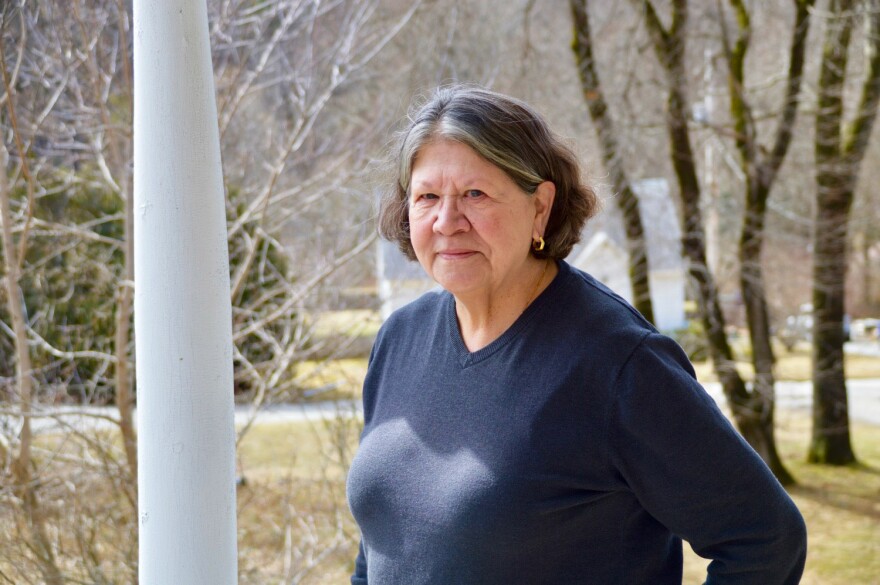At 74, Mary Coonradt is in a population vulnerable to the coronavirus. But she still goes to work every day, caring for the elderly.
Coonradt has been a registered nurse for 20 years, and she works full-time at Springfield Health and Rehabilitation Center, a nursing home with about 60 residents.
While there are no reported cases of COVID-19 there, nursing homes are among the places most heavily impacted by the coronavirus. Nationwide, NBC reports more than 5,500 deaths have been linked to outbreaks in nursing homes and long-term care facilities. Residents are also currently cut off from family and friends, and that’s put even more pressure on their caregivers.
Coonradt spoke to VPR about her work from her Ludlow apartment’s porch, where she enjoyed a cup of coffee in the sun on her day off.
“I mean, it's different,” she said. “We’re strict, no visitors. Even when the meds get dropped off in the evening, they have to ring the bell. They leave ‘em outside. We pick 'em up. They're not even allowed in the building.”
"Not that I wanted to fight COVID-19, but I've always wanted to be a nurse. And I knew what it involved. So no, I knew what I was getting myself into." — Mary Coonradt
When Coonradt comes to work, her temperature is taken, and she has to fill out a questionnaire asking about COVID-related symptoms, like if she’s been feeling more tired, if she can taste and smell, if she has a new cough.
Those are all precautions to care for the vulnerable population inside the nursing home. Coonradt said she’s older than some of the residents, which puts her at higher risk for COVID-19, too. But she shrugs her shoulders – she’s not afraid to go to work. The staff take precautions, and she said they’ve got enough gloves, masks and protective gowns.
“Not that I wanted to fight COVID-19, but I've always wanted to be a nurse,” Coonradt said. “And I knew what it involved. So no, I knew what I was getting myself into.”
Coonradt wears her chin-length gray-brown hair tucked behind her ears, and her face has soft wrinkles. She talks about her nursing home work in a no-nonsense, confident kind of way, and you can tell she takes pride in it.
“I worked in critical care when I lived out west, and it was fun when I was younger,” Coonradt said. “But now I want a more relaxed pace. And I love the residents. I love the older people. They make me feel at home.”
What are your questions, concerns and experiences with the coronavirus? Share them with VPR, here.
Plus, her job pays the bills. Coonradt is single and said she can’t live on social security – retirement’s not an option yet.
“I think being at home alone is more stressful than going to work,” she said. “At least going to work, I have, you know, my coworkers, and I can talk to another human being ... you have that camaraderie.”
But things have changed at work. Before, residents who could sit outside and enjoy some sunshine, there were group activities and music programs that broke up the day – and this gave Coonradt and the other nurses a break.
“And now there's none of that,” she said. “I have one lady whose husband came in every single day and again, they’ve probably been married 75 years. And of course, he's not coming in. He calls every day, but she forgets that. And she thinks now that he hates her. And trying to explain to her that, you know, there's a crisis going on in the world, and he can't come to visit right now. But he does call every day, and it's sad. It really is.”
"And I love the residents. I love the older people. They make me feel at home." — Mary Coonradt
She continued: “Then I have another gentleman whose wife would visit every day. And he has dementia. And I'm sure that when the wife is allowed back, he's not going to remember her."
Coonradt talked about another resident who reads lips because she’s so hard of hearing, but with everyone in masks, it’s frustrating.
“But, you know, you can still say a lot with your eyes,” Coonradt said. “You can say a lot with your hands. The tone of your voice. And just spending the extra time with them. That's all they want, is a little extra time.”
Little things mean a lot more now.
“We had one lady – it was her birthday, and the son had a beautiful cake made, and we brought it up because he couldn't,” Coonradt said. “But he sat outside, and we put her in the window, and she was able to wave to him from there, so that made them both feel good. ‘I did visit my mom on her birthday. My son did visit me on my birthday. Look at this lovely cake he brought me.' Even though he couldn't physically be there to blow out the candles with her, we were.”
Coonradt said one thing that does worry her is the current shortage of trained caregivers, something hospitals and long-term care facilities in Vermont are feeling acutely.
She said she hopes all the appreciation medical personnel are getting throughout this pandemic might encourage more people to become nurses.






